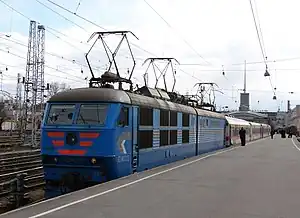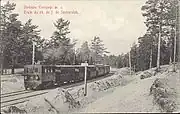Electrification of Saint Petersburg Railway Division
Electrification of Saint Petersburg Railway Division. Direct lines from Saint Petersburg Finlyandsky–Vyborg and Saint Petersburg Finlyandsky–Beloostrov through Sestroretsk continued to work with steam haulage after the Russian Revolution up to World War II.
|
|||||||||||||||||||||||||||||||||||||||||||||||||||||||||||||||||||||||||||||||||||||||||||||||||||||||||||||||||||||||||||||||||||||||||||||||||||||||||||||||||||||||||||||||||||||||||||||||||||||||||||||||||||||||||||||||||||||||||||||||||||||||||||||||||||||||||||||||||||||||||||||||||||||||||||||||||||||||||||||||||||||||||||||||||||||||||||||||||||||||||||||||||||||||||||||||||||||||||||||||||||||||||||||||||||||||||||||||||||||||||||||||||||||||||||||||||||||||||||||||||||||||||||||||||||||||||||||||||||||||||||||||||||||||||||||||||||||||||||||||||||||||||||||||||||||||||||||||||||||||||||||||||||||||||||||||||||||||||||||||||||||||||||||||||||||||||||||||||||||||||||||||||||||||||||||||||||||||||||||||||||||||||||||||||||||||||||||||||||||||||||||||||||||||||||||||||||||||||||||||||||||||||||||||||||||||||||||||||||||||||||||||||||||||||||||||||||||||||||||||||||||||||||||||||||||||||||||||||||||||||||||||||||||||||||||||||||||||||||||||||||||||||||||||||||||||||||||||||||||||
First project
In 1930, the first project for electrification of a railroad line of seashore–Beloostrov rings was developed. But the state boundary was in the urban-type settlement Beloostrov, and the authorities did not improve the transport accessibility area. They rightly believed that the availability of suburban passenger electric trains would increase the number of summer residents in direction of traffic.[1]
Implementation
Without waiting for the end of the war, the chief of department of electrification of the October Railway Kirillov made an application for electrification of the seashore–Beloostrov rings and directions to station Terioki addressed to the Leningrad city town committee VKP managing transport department. After the war, the state border was pushed to a distance of more than 100 kilometers (over Vyborg) and the electrification program was not hampered.[1]
Documents
Documents were issued on the basis of which the electrification of the Leningrad – Zelenogorsk line was authorized:[1]
- Decision of the Council of Ministers of the USSR No. 858-316, dated 4 March 1950;
- The order of the Minister of Communications Beschev B. P. No. 176/Ц dated 17 May 1950;
- The final draft prepared by the Institute Lengiprotrans, engineers Keltuyala and Mazursky.
Timeline of electrification
- Finlyandsky Rail Terminal–Zelenogorsk – 1951
- Zelenogorsk–Ushkovo – 1952
- Ushkovo–Roshchino – 1954
- Roshchino–Kirillovskoye – 1968
- Kirillovskoye–Vyborg – 1969
- Vyborg–Luzhayka – 1977
- International connection – 1978
Picture gallery
 Electric locomotive with "Sibelius" train (Saint-Petersburg, Russia – Helsinki, Finland) in 2007
Electric locomotive with "Sibelius" train (Saint-Petersburg, Russia – Helsinki, Finland) in 2007 Train under the name NEVA at the Finlyandsky Rail Terminal, Saint Petersburg, Russia, in 2009
Train under the name NEVA at the Finlyandsky Rail Terminal, Saint Petersburg, Russia, in 2009 Train under the name Change at the Finlyandsky Rail Terminal, Saint Petersburg, Russia, in 2009
Train under the name Change at the Finlyandsky Rail Terminal, Saint Petersburg, Russia, in 2009
See also
References
- Penin, Alexander. "Sequence of electrification of sites of railways of Karelian isthmus (Последовательность электрификации участков железных дорог Карельского перешейка)" (in Russian). perecheek.narod.ru. Retrieved 14 February 2009.

